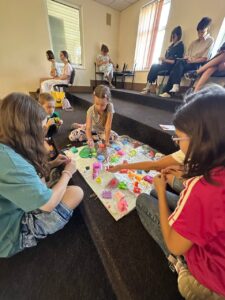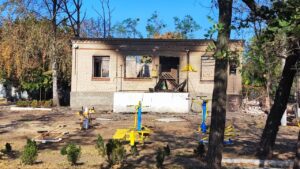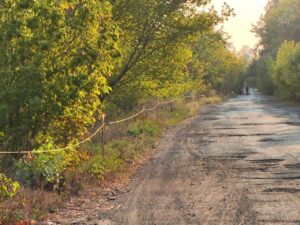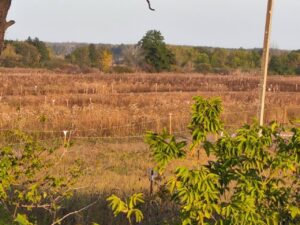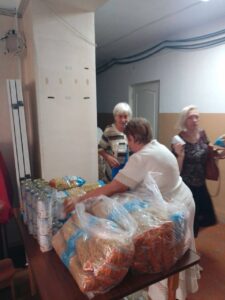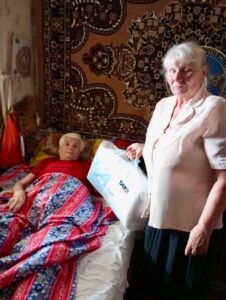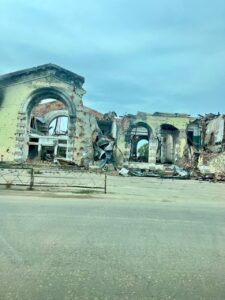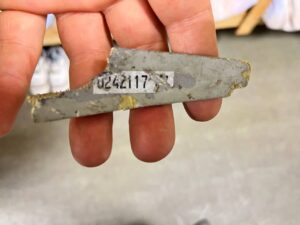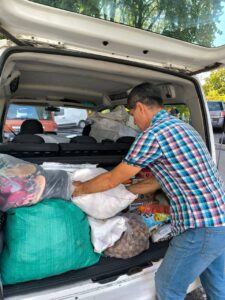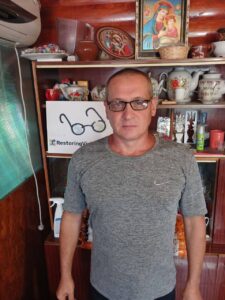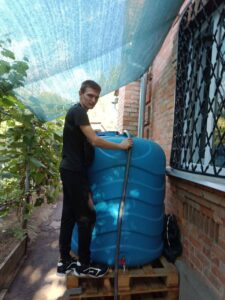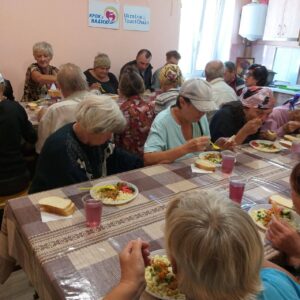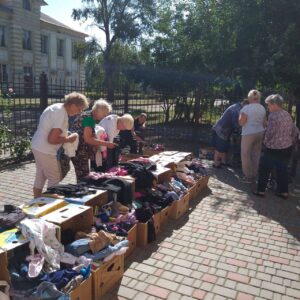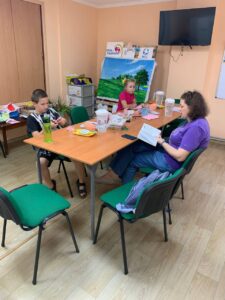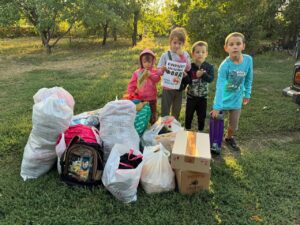Last week, the situation remained unchanged, as it was before. In Kherson, the shelling has intensified, but this is not artillery anymore; drones are dropping explosives on several districts simultaneously. People are trying to leave these areas, public transport no longer goes there, and getting there becomes more and more difficult. Even taxi drivers refuse to go to those areas. One district of Kherson has almost died out, though some people still live there. They are left without electricity, gas, and consequently, water. Not long ago, a shell damaged the water station, tearing the pipes, and water disappeared too. In the places where we deliver aid, there is still water, but no electricity. We must be very careful when traveling, and it is best to go in the morning.
We are conducting disinfection—treating basements for fleas. Due to shelling and drones constantly flying, some people have been forced to live in basements. Bomb shelters are set up in almost every building. However, these shelters are dirty, which contributes to flea infestation. We still don’t know why this happens—perhaps they are ground fleas, or maybe they come from animals that lived in these basements, mostly cats. We treat not only residential premises but also government institutions and hospitals. Although there are not many people left in the city, work continues, and help is needed. There were no such problems in Kherson with mice, cockroaches, or fleas when the city was populated; people dealt with these pests themselves. Now, with fewer people, the problem has become very serious.
We also deliver food directly to the disabled, the less mobile, and those who can’t leave their homes. This is very difficult, but such help is essential. We communicate with people, find those in need, and do everything to keep them alive.
Konstantynivka, Druzhkivka
In Konstantynivka, the shelling has intensified: artillery, drones, and KAB rockets. One of the drones fell near the distribution point, damaging the roof, which had to be repaired under fire. 200 meters from the distribution point, another KAB rocket hit and damaged the roof, so the tiles had to be fixed again. On Saturday morning, one of the rockets exploded not far from our volunteer, causing his car to be thrown up. He didn’t even have time to get scared.
Kramatorsk, Sloviansk, Mykolaivka
On September 13, we went to Kramatorsk to distribute humanitarian aid and provide psychological support to people staying in the region. This week, the situation worsened in the Pokrovske direction, and during the entry, volunteer buses were stopped and filmed as part of a report: who we are, which foundation we represent, and where we are going. If not to Pokrovsk, then we had to explain the exact route. We understood this was done to protect the police, as the city is under artillery fire.
This week, we helped people evacuate. We managed to evacuate one woman from Kramatorsk to Petropavlivka in the Dnipropetrovsk region. People want to leave, and we are ready to help them, but they don’t know where to go, and we don’t always know either. The foundation’s task is to evacuate people, not to decide where they should go, which remains a problem.
This week, we provided psychological support, distributed food, clothing, and diapers. We also visited Mykolaivka, which is located near Kramatorsk and Sloviansk. It is a very grey zone. During the border crossing, we were told we weren’t on the list. To visit Mykolaivka, you need permission from the governor of the Donetsk region.
Kharkiv Region – Studenok, Zmiiv District
On September 14, we went to the village of Studenok in the Zmiiv district of Kharkiv region. This settlement became infamous due to massive fires that, according to the latest statistics, destroyed about 300 homes. We managed to purchase gas equipment, including 30 cylinders for cooking, which was a pressing need. We also purchased tools such as shovels, hammers, saws, and axes so that people could start rebuilding.
When we arrived, we were horrified by the sight. We were accompanied by a local administration representative, Tatyana, whose house had also burned down. She is now living with acquaintances. We visited several families who needed help, and we saw the scale of the fire. Despite everything, people have not lost hope. Their hearts are heavy, but they are trying to collect what remains and move on. One of the reasons they do not give up is that they have not been left alone. Besides us, other organizations also help them, especially with building materials. This gives people confidence and hope for the future.
As we drove through the area, we saw a familiar sight—mines on the sides of the road and in the fields around the village, reminding us again of how dangerous the zone is.
We were particularly struck by a scene when we arrived at the administrative building. It had completely burned down, and a shell exploded nearby. On the grounds of the administration, there was a children’s playground, everything blackened and burnt, but two kids were happily playing on the only swing that survived. This is the reality.
Znamyanka
In Znamyanka, more families with children, displaced from Kharkiv, have arrived. There is a need for grains, canned goods, especially diapers for children, and firewood to heat houses. People are grateful for the bread provided because prices are rising, and some families can’t even afford it.
Chuhuiv and Kochetok
The situation in the region has significantly worsened. Shelling of both infrastructure and residential houses has increased. Housing for internally displaced persons (IDPs) is insufficient, and there aren’t enough funds to repair roofs. Portable diesel generators, firewood, pruning shears, roofing materials, and concrete rings for public wells are needed.
This week, we conducted a second round of inspections. People are very concerned about the frequent shelling and power outages, but they have nowhere to go and no money to leave.
I, Nina Sergeevna Petrushina, born in 1953, temporarily displaced from Volchansk, where the situation was very difficult. I thank the volunteers for transporting me to Chuhuiv and for the care they provide.
Merefа
Pensioners, disabled people, the underprivileged, and displaced persons received assistance this week. New displaced persons have arrived, and people are thankful for the bread provided. There is a dire need for grains and oil. Despite all the difficulties, it is heartening to see how people have united and are helping one another.
Balakliya
The situation in Balakliya has not changed much. Electricity and water are cut off at times. There is an increasing number of people affected by recent shelling. There is a great need for laundry detergent, hygiene products, and adult diapers.
Krasnohrad
The number of displaced persons from combat zones has increased in Krasnohrad. In addition to food, people are in urgent need of hygiene products. Furthermore, there is an urgent need to repair the vehicle used to distribute humanitarian aid.
Nadiya Rudyk, 34, a displaced person from Volchansk, was injured after shelling but hesitated to leave home with her disabled husband. When the situation worsened, they evacuated to Krasnohrad. She is very grateful for the help and support.
Kupiansk
This week, we were able to deliver aid to Kupiansk for the residents and the military. We brought food, medicine, and clothing.
Kharkiv, Kamyana Yaruga, Mala Danylivka
From September 9 to 15, we made several trips to the city of Kharkiv, Mala Danylivka, and Derhachi. Shelling in Kharkiv has decreased slightly, and the situation has improved somewhat, but there are still threats. At the end of the week, on Friday, we held a meeting for teenagers and children, followed by a tea party with treats. On Saturday, we distributed bread. In the evening, we held a cinema event where children discussed different life situations. We were surprised by how unconventional the children’s answers were to quite ordinary situations.
After that, there was shelling, and we had to hide in the shelter at the aid distribution center for a while.
Nikopol, Dnipropetrovsk Region
This week, we worked in all available directions: supplying water, glasses, and food. Our main efforts were focused on the area where the need for help is most critical. For example, in the village of Maksymivka, in the direction of Marhanets, there is an urgent need for assistance. On the day we arrived, people came in an endless stream, and even though we had planned to serve a maximum of 60 people, in the end, we helped 125. We gave each of them attention and provided pasta.
We held the reception in the courtyard of the local official’s house, assisting both civilians and military personnel. There is no ophthalmologist in this area, so people are in great need of such help. Some of them had visited private clinics, and we corrected their mistakes.
Pavlohrad
On September 11, we made trips between Pavlohrad and Dnipro to receive, transport, and distribute humanitarian aid, including food packages, treats, and clothing, as well as to report on previous work. A total of 30 displaced people and their families, as well as the disabled and those in need, received assistance. 89% of them were women, and 11% were men.
The situation in Pavlohrad has not changed much this week, but the need was urgent due to the arrival of many displaced people from Pokrovsk. We were able to find housing for two people and are still searching for a place for another person. What is truly inspiring is how both displaced people and local residents participating in our humanitarian program are supporting each other and helping find housing, for example. This gives us hope.
Kamianske
From September 9 to 15, the volunteer center in Kamianske worked at full capacity. We transported humanitarian aid to Kryvyi Rih and across Kamianske, delivering food packages and clothing to internally displaced persons (IDPs). The women’s center “Berehynya” and the children’s center “Smile” continued their work. We also organized charity dinners and distributed glasses.
Tatyana, 42 years old, a resident of Donetsk region, shares her story: “In 2014, our city of Debaltseve was occupied, and I was evacuated to Russia with my two children, to the city of Taganrog. But we didn’t like living there, and in 2015 we returned to Ukraine. After the full-scale invasion and the destruction of our house, we headed to western Ukraine, but it was impossible to find a job there. Now we live in rented accommodation in Verkhnodniprovsk. This is the first time I have received humanitarian aid in Kamianske, and I want to express my gratitude for the support and significant help during this difficult time for displaced people.”
Dnipro
Love is action, not words… This is what real love looks like! A large family received help: clothing, shoes, food, and toys—all the essentials for the children. This family urgently needs our support. The father is in a serious condition, all the money goes toward his treatment (cancer). He needs chemotherapy and must go to Kyiv for treatment again.
